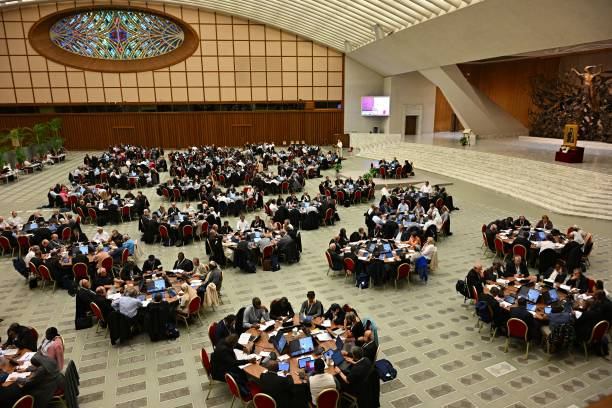On Oct.18th, at the Mass and event held at the Franciscan Education Center in Jeong-dong, Seoul, those who had a connection with the Maryknoll Sisters in the past gathered to express their gratitude and congratulations.
The Superior General of the Maryknoll Sisters of America, the Maryknoll sisters and priests from Japan and Korea, and priests from several neighboring religious orders, mission societies, and diocesan priests attended the Mass that day.
Above all, the Sisters of Our Lady of Perpetual Help, whom the Maryknoll Sisters helped to found and nurture, the Women Workers' Association, Busan Maryknoll Hospital and the Anesthesia Nurses' Association, the Catholic Labor Youth Association and the Young Adults' Association, and the Ecological Spirituality Group, as well as members and friends of each local community that accompanied them in Korea, remembered and celebrated the 100th anniversary together.
The 100th Anniversary Mass of the Maryknoll Sisters was held on the 18th at the Franciscan Education Center in Jeong-dong, Seoul. Father Richard Augustine, Maryknoll Fathers' local superior, Father Phil Mares, and Father Hong Geun-pyo of the Archdiocese of Seoul concelebrated the Mass that day.
The founding purpose of the Sisters of Maryknoll was to “participate in missionary work of the universal church, spread the justice, peace, and love proclaimed by Christ to all people, and bear witness to this through the lives of the sisters in every part of the world. " The six nuns who arrived in North Korea on October 24, 1924 embodied this purpose in Korea.
The Sisters of Maryknoll, established in 1912, were the first convent in the United States for overseas missions. In 1923, when the founder, Mother Mary Joseph, visited Korea, the priests and nuns of the Maryknoll Society working in the Pyongyang Diocese requested the presence of the Maryknoll Sisters.
Sister Mary Joseph emphasized the ‘love’ present throughout Jesus’ life and activities. The most important thing in the Maryknoll Sisters' identity consciousness was the ‘female’ missionary.
About 100 people gathered to celebrate the 100th anniversary Mass that day. Following the six who were sent, the 120 fellow nuns for 100 years followed the founder’s request to become people with “Christ-like mercy, a clear and simple soul, heroic generosity, selflessness, steadfast loyalty, diligent zeal, gentle hospitality, and the grace of affectionate humor” wherever they lived.
They embraced the women, children, workers, and the sick who were suffering, especially amid the historical suffering of the Korean people, and went wherever they could as doctors, nurses, teachers, social workers, environmental activists, friends, and sisters.
Home visits and vocational training in Uiju, Sinuiju, Jinnampo, and Pyongyang in North Korea, support for the establishment of the Sisters of Our Lady of Perpetual Help in 1932, the kidnapping of Sister Jang Jeong-on, a Korean-born Sister Aknita, medical activities by nuns who arrived in Busan in 1949, the Korean War, and the resumption of medical ministry after fleeing to Japan but unable to turn away from refugees, and the sharing of clothing and food continued amid the war.
After the end of the Korean War, the areas of ministry and mission expanded until 1956, establishing medical centers in Jeungpyeong and Ganghwa, social welfare and worker ministry in Incheon, school ministry, operation of Maryknoll Hospital in Busan, credit union activities, and nursing school.
After the war, as reconstruction and development took place, the nuns left the city and went to islands and rural areas. While continuing medical and social welfare activities, they also created communities for justice, peace, and human rights and lived with workers and abused women. Four Maryknoll Sisters are active in Japan, and two are in Korea, among the Northeast Asian regions.
Sister Joan Mun celebrated her 70th anniversary in Korea last year. Her diary expresses her determination to spread good news and love to the ends of the earth.
At the memorial Mass, Mother Teresa Honen began her sermon with the words of founder Father James Walsh, “We remember the mission of the Apostle Luke,” and “We go to places where we are not wanted but needed, and when we are wanted but no longer needed, we leave.”
Mother Teresa Honen said that the service and pastoral work of the Maryknoll Sisters up to this point has been a sign of God’s love for the Korean people and that when the Korean people suffered from the war, we suffered together. “The division of Korea, the kidnapping and death of Sister Jang Jeong-on were all of our suffering, and we worked together for peace, justice, and the abused. We stayed with them, ate with them, and experienced the kingdom of God.”
“Our mission today is to live in sharing with all people and all of creation,” she said. “The mission of missionaries is to convey God’s love for all people, and we came here to fully demonstrate this love. We came here for love, were loved, and were united by love.”
“Our hearts are filled with gratitude for the love the Korean faith community has welcomed us. Together, we will continue to create a world of peace and inclusion for all of creation,” she said.
The nuns of the Sisters of Our Lady of Perpetual Help also expressed their gratitude, saying, "We, the spiritual fruit of the Maryknoll Sisters, are deeply moved by the sisters' love and passion for the Lord, and through their sacrifice and devotion, we too have been able to proclaim the gospel to our people and all of humanity."
The Maryknoll Sisters currently have 280 nuns in 19 countries. 100 Years of Maryknoll Sisters in Korea, “The Journey Is Not Over”






